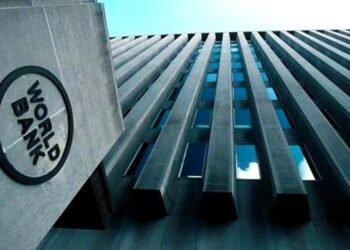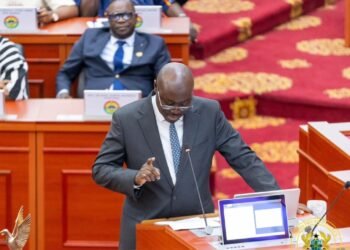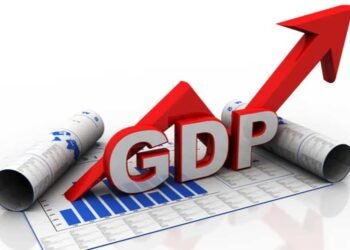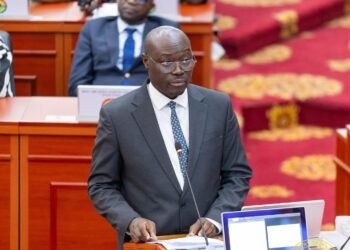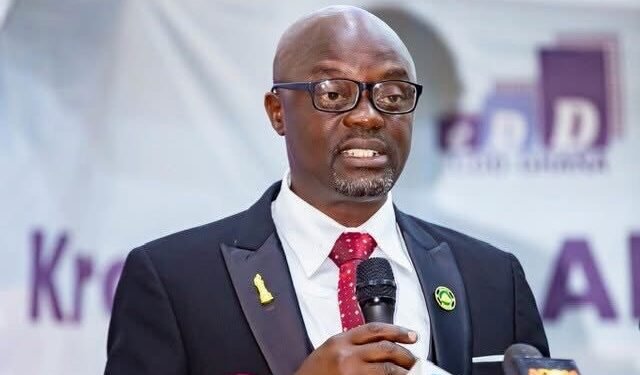An Associate Professor of Economics at the University of Ghana, Prof. Festus Ebo Turkson, has issued a strong warning about Ghana’s increasing dependence on imported goods, cautioning that the nation’s economic foundation remains fragile and overly exposed to external shocks.
Speaking at a high-profile seminar organised by the UK-Ghana Chamber of Commerce in collaboration with Deloitte Ghana, on the theme “Enhancing the Investment Climate in Ghana: The Role of Government,” Prof. Turkson underscored the urgent need for Ghana to diversify its production base to achieve sustainable growth.
“Our production base is too narrow. We import almost everything. And as the growing middle class comes up, we are becoming much more import dependent rather than being self-sufficient.”
Prof. Festus Ebo Turkson
According to him, this overreliance on imports leaves Ghana’s economy vulnerable to global market volatility, exchange rate shocks, and supply chain disruptions—factors that undermine efforts to build resilience and long-term growth.
Call for Deliberate Policies to Drive Local Demand
Prof. Turkson argued that the solution lies not in short-term fixes, but in a deliberate policy drive to stimulate demand for local produce and encourage value addition within the economy. He emphasised that government must lead this transformation by cultivating a culture of consuming Ghanaian-made products instead of leaving the process to market forces.
“Adding value to and demanding local produce will boost productivity. Once we produce enough for export, we can then produce for import substitutes.”
Prof. Festus Ebo Turkson
He stressed that supporting local farmers and entrepreneurs in agro-processing and light manufacturing will create a ripple effect that enhances employment, raises incomes, and reduces the economy’s vulnerability to global disturbances.
“Diversifying Ghana’s production base starts with supporting our farmers and strengthening the local supply chain. We must create policies that reward firms adding value locally while reducing the incentives that sustain our appetite for imports.”
Prof. Festus Ebo Turkson
The economics professor further highlighted the importance of investing in human capital to sustain Ghana’s industrial transformation. According to him, the quality of Ghana’s human resources has improved from “low” to “moderate” over the past two decades—a promising sign for the country’s development prospects.

However, he noted that more needs to be done to align educational systems with industry needs. “What we need now is to tailor education to the needs of industry,” he said. “Our tertiary institutions should collaborate with businesses to design programmes that produce graduates ready for the modern workplace.”
Prof. Turkson also proposed that soft infrastructure such as youth training centres, digital skills hubs, and vocational institutions should be strengthened to equip the youth with the right competencies for industrial growth.
He suggested that government provide incentives for firms that adopt appropriate, labour-intensive technologies, as this would generate sustainable employment and ensure that the benefits of industrialisation reach a broader segment of the population. “This is the way we can develop. That is what we call transformation,” he concluded, drawing applause from participants.
Deloitte Experts Highlight Key Investment Bottlenecks
During the seminar, other experts from Deloitte Ghana and the UK-Ghana Chamber of Commerce also shared their perspectives on the country’s investment climate.
Cheryl Otoo, a Senior Manager at Deloitte Ghana, identified regulatory complexity and infrastructure deficits as two of the biggest barriers to attracting and retaining investors. She urged government to simplify business registration processes, harmonise tax regulations, and address energy and logistics challenges that continue to hinder investment flows.
Wisdom Kpano, Partner at Deloitte Ghana, recommended that the government channel more resources into agriculture and agro-processing, renewable energy, and oil and gas, describing these sectors as high-potential growth drivers capable of transforming Ghana’s economy.
Similarly, Nicolas Jørgensen Gebara, CEO of the European Chamber of Commerce in Ghana, pointed to digital transformation and mining as promising areas for investment—particularly within the framework of the government’s 24-Hour Economy Policy.
Investor Opportunity Mapping Project
The discussion also highlighted progress being made through the Ghana Investment Promotion Centre’s (GIPC) latest initiative—the Investor Opportunity Mapping Project.
Kwame Kesse Agyapong, Head of the Investment Promotion and Business Development Division at GIPC, explained that the project aims to identify viable investment opportunities in all districts across Ghana. “After mapping them out, we will host the international and domestic investor community next year to showcase these projects and attract capital,” he revealed.
The initiative aligns with the government’s vision to expand manufacturing, building and construction, and ICT sectors, while promoting agribusiness and agro-processing under the 24-Hour Economy Policy.
Mr. Kpano praised the initiative for its potential to generate valuable investment data but urged GIPC to track the impact of actual investments, including those made by local businesses. “We should do more to raise awareness so existing Ghanaian-owned enterprises can also access GIPC opportunities,” he advised.
The seminar, moderated by Deloitte Ghana’s Naa Ayeley Komey, concluded with a strong consensus among participants that policy consistency, education-industry collaboration, and strategic communication are essential to positioning Ghana as an attractive destination for both domestic and foreign investors.
READ ALSO: NAIMOS Seizes Over 450 Excavators to Curb Illegal Mining





